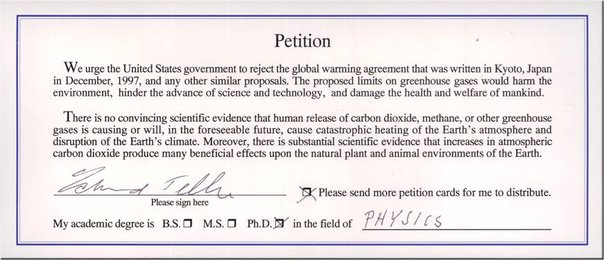
Qualifications of Signers
Signatories are approved for inclusion in the Petition Project list if they have obtained formal educational degrees at the level of Bachelor of Science or higher in appropriate scientific fields. The petition has been circulated only in the United States.
The current list of petition signers includes 9,029 PhD; 7,157 MS; 2,586 MD and DVM; and 12,715 BS or equivalent academic degrees. Most of the MD and DVM signers also have underlying degrees in basic science.
All of the listed signers have formal educations in fields of specialization that suitably qualify them to evaluate the research data related to the petition statement. Many of the signers currently work in climatological, meteorological, atmospheric, environmental, geophysical, astronomical, and biological fields directly involved in the climate change controversy.
The Petition Project classifies petition signers on the basis of their formal academic training, as summarized below. Scientists often pursue specialized fields of endeavor that are different from their formal education, but their underlying training can be applied to any scientific field in which they become interested.
Outlined below are the numbers of Petition Project signatories, subdivided by educational specialties. These have been combined, as indicated, into seven categories.
1. Atmospheric, environmental, and Earth sciences includes 3,805 scientists trained in specialties directly related to the physical environment of the Earth and the past and current phenomena that affect that environment.
2. Computer and mathematical sciences includes 935 scientists trained in computer and mathematical methods. Since the human-caused global warming hypothesis rests entirely upon mathematical computer projections and not upon experimental observations, these sciences are especially important in evaluating this hypothesis.
3. Physics and aerospace sciences include 5,812 scientists trained in the fundamental physical and molecular properties of gases, liquids, and solids, which are essential to understanding the physical properties of the atmosphere and Earth.
4. Chemistry includes 4,822 scientists trained in the molecular interactions and behaviors of the substances of which the atmosphere and Earth are composed.
5. Biology and agriculture includes 2,965 scientists trained in the functional and environmental requirements of living things on the Earth.
6. Medicine includes 3,046 scientists trained in the functional and environmental requirements of human beings on the Earth.
7. Engineering and general science includes 10,102 scientists trained primarily in the many engineering specialties required to maintain modern civilization and the prosperity required for all human actions, including environmental programs.
The following outline gives a more detailed analysis of the signers’ educations.
- Atmosphere, Earth, & Environment (3,805)
- Atmosphere (579)
I) Atmospheric Science (112)
II) Climatology (39)
III) Meteorology (343)
IV) Astronomy (59)
V) Astrophysics (26) - Earth (2,240)
I) Earth Science (94)
II) Geochemistry (63)
III) Geology (1,684)
IV) Geophysics (341)
V) Geoscience (36)
VI) Hydrology (22) - Environment (986)
I) Environmental Engineering (487)
II) Environmental Science (253)
III) Forestry (163)
IV) Oceanography (83)
- Atmosphere (579)
- Computers & Math (935)
- Computer Science (242)
- Math (693)
I) Mathematics (581)
II) Statistics (112)
- Physics & Aerospace (5,812)
- Physics (5,225)
I) Physics (2,365)
II) Nuclear Engineering (223)
III) Mechanical Engineering (2,637) - Aerospace Engineering (587)
- Physics (5,225)
- Chemistry (4,822)
- Chemistry (3,129)
- Chemical Engineering (1,693)
- Biochemistry, Biology, & Agriculture (2,965)
-
Biochemistry (744)
I) Biochemistry (676)
II) Biophysics (68) - Biology (1,438)
I) Biology (1,049)
II) Ecology (76)
III) Entomology (59)
IV) Zoology (149)
V) Animal Science (105) - Agriculture (783)
I) Agricultural Science (296)
II) Agricultural Engineering (114)
III) Plant Science (292)
IV) Food Science (81)
-
Biochemistry (744)
- Medicine (3,046)
- Medical Science (719)
- Medicine (2,327)
- General Engineering & General Science (10,102)
- General Engineering (9,833)
I) Engineering (7,280)
II) Electrical Engineering (2,169)
III) Metallurgy (384) - General Science (269)
- General Engineering (9,833)
Climate Petition Projects
Qver 33,000 scientists have stated their position by signing two separate petitions asserting that the sciences do not and cannot allow for carbon dioxide and other minute trace gases such as methane to increase the Earth’s surface temperature.
Such claims violate the fundamental law of conservation of mass and energy. This law states that neither matter nor energy can be created or destroyed but can simply be changed from one form (matter or energy) to the other. The formula postulated and since proven by Albert Einstein is E=MC2. Energy equals Mass times the velocity of light C Squared. The velocity of light is 2.99 x 108 meters per second or 186 thousand miles per second.
What this means in terms of temperature increases on the Earth simply stated is that the only material source of thermal and light energy on the earth comes from the Sun. It can not be accumulated or stored by so called greenhouse gases and added to contribute more energy (heat) on the Earth no matter how concentrated these “greenhouse gases” are. And furthermore carbon dioxide is a trace gas constituting only 400 parts per million of the total amount of gasses in the atmosphere which are nitrogen (78%) and Oxygen (21%).
No matter how you look at it there is simply no way these trace gases can create AGW or man produced climate change.
In the late 1990s and early 2000s, Dr. Art Robinson created a petition signed by over 30,000 scientists with over 9,000 having Ph.D.s in their fields; mostly physics and chemistry. This can be found at the Climate Petition Project.
In 2019 emeritus professor of geophysics Guus Berkhout and science journalist Marcel Crok founded Clintel. As of March 2024 Clintel has gathered over two thousand signatories of leading scientists worldwide rejecting AGW/climate change based on the fundamental sciences of physics, chemistry, geology, and meteorology. Click here to review Clintel, its mission, methods and most importantly its list of signatures.
In summary greenhouse gasses do not and can not increase the earth’s temperature. They simply delay cooling but in amounts that are unmeasurable on the surface of the Earth.
